John Coyne (Ethiopia) — “The Big Bad Brown Swiss”
A Writer Writes
The Big Bad Brown Swiss
By John Coyne
I was seven or eight years old when I got so drunk at a family party that I ran out of our farmhouse, down to the barn, and attacked our big brown Swiss cow with a broom.
I don’t remember this act of animal cruelty, but the next morning, when I woke from a stupor, my mother—as well as my brothers and sisters—told me in detail how I had impishly sipped booze left in cans and glasses on the dining room table until I was so intoxicated my suppressed rage at one of our milking cows exploded into violence.
I was quite a sight, I was told, reeling away from the summer afternoon gathering on our farmhouse front porch and running yelling down the driveway with my brothers and sisters and all the relatives in pursuit, amused by my drunkenness and puzzled by my raging attack on the helpless cow.
There was a reason for my wrath. That brown Swiss was the bane of my existence. She was the cause of my nightmares and sleepless nights, the anguish of my boyhood farm life.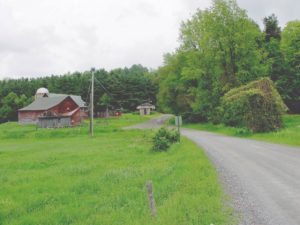
The Swiss and I had first crossed paths when I was four years old. I had left my mother weeding in the garden and gone off to find my Dad who was plowing one of the fields of our small farm south of Chicago.
It must have been some adventure for me, just above toddler stage, to leave my mother’s side and circle the summer garden and cross the wide green lawn, heading for the plowed acreage beyond the wire fence and the yellow flowers that grew wild at the edge of the field.
I have this recollection of the sounds of birds and buzzing flies as I trekked through the singing grass to reach the gate which opened into the field. I could see my Dad in the far distance. He was perched high on his red tractor, in the heat of the summer day. It was at that point that I came upon the cow.
The Swiss had been grazing on the grass that edged the fence and was blocking the opening to the field beyond.
She made some sort of pass at me, bucked me back with her cold wet nose. I’m not sure what she made of me. Was I just another farmyard animal edging into her grassland? A wayward calf?
There was nothing brutal about her butting nose, though I fell backward, tumbled over, and started to cry. I got up and tried again to circle the animal. I took a wider berth and she turned on me again, this time dancing in nervous excitement as cows sometimes do, with all four legs in flight, as if she were a malfunctioning mechanical toy.
I let out a scream and tumbled a second time, calling to my Dad, who seemed miles away, and who could not hear me, over the engine, nor see me, no taller than the long summer grasses.
I think I tried a third time to outmaneuver the brown beast. I want to believe I was that brave. I have a recollection of flanking her, sprinting ahead on my chubby, short legs, only to be repelled, to have the cow dip her wide forehead once more and halt me. But I may be putting a better, braver face on my childhood courage. I can’t remember how intrepid I actually was.
I do remember running home crying to my mother and being comforted as I told my tragic tale. From them on that big, brown Swiss was my dreaded foe.
*
A few years later, one of my first chores on our farm was to bring the cows in for milking at the end of the day. Wherever I was at play, whatever I was doing, I’d be called away by my mother and sent off to get the herd.
After the morning milking, our half dozen cows were turned loose to graze in the fields, and in the evening my job was to bring them in from the pasture.
They seldom had the good sense to gather by the barn door and wait for me. No, they’d wandered off during the long day of grazing and reached the far ends of our fields when it was time to bring them home.
I could have made a sport of herding them, but I wasn’t allowed to ride up the hillside on my pony and drive them back to the barn as if I was another Roy Rogers or Hopalong Cassidy. The cows couldn’t be hustled, not with full udders that would spray milk as they galloped. No, I had to trek across the hot open land to where they had clustered, with their thick necks stretched through the wire fence, trying desperately to munch grass that was, of course, greener on the other side.
#
Ours wasn’t much of a farm. We raised poultry, pigs and sheep, and a half dozen milking cows. Enough livestock to feed our family.
My Irish immigrant parents had moved our family of six kids to this farm from Chicago prior to World War II. My Dad’s real job was as a steelworker in the mills of Indiana Harbor, Indiana but the farm gave my parents a sense of the rural life they both had growing up in Galway and Mayo in western Ireland. It was the way they wanted to raise their children in America.
In those war years on a farm, I never experienced the hardships of rationing. Years later when I was in college I ate Spam for the first time and marveled at its taste while my dorm mates rolled their eyes in disgust, having suffered through years of canned meat.
No, my life wasn’t touched by the hardships of war, but I spent my youth battling the big brown Swiss.
At the time our fields were fenced in with barbed wire, enough to contain the rest of the livestock, but not enough to keep the Swiss from seeking new pastures.
The big brown Swiss was never content with our limited acres and a half dozen times a summer she’d somehow wedge herself out, break a fence pole, squeeze between loose strands of wire and be gone, taking off down the country road.
I’m not sure why I took the cow’s escape as my personal responsibility. I always felt that it was my fault whenever the Swiss broke through the fence. There must have been something in the family tension at home, some frantic furor between my parents when the cow broke out, some sense of financial loss perhaps that made the Swiss’ escapes my childhood curse.
Now, when you are that young, and your only responsibility in life is to bring home the cows, seeing that the big brown Swiss was missing was a traumatic event. I took it personally.
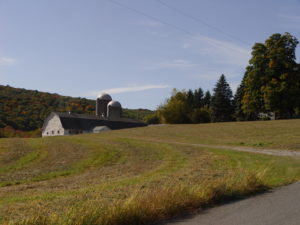 The farms beyond our place at that time in the late forties were being sold off in small lots and new houses were under construction. People were leaving Chicago in the years following the war and the countryside was rapidly being transformed into suburbs.
The farms beyond our place at that time in the late forties were being sold off in small lots and new houses were under construction. People were leaving Chicago in the years following the war and the countryside was rapidly being transformed into suburbs.
Often, running down the gravel country road, I’d spot our Swiss on someone’s newly sodded green lawn, or see her being chased by dogs, running through clotheslines and clean wash, leaving in her wake a spray of milk from her full, heavy udder.
In a kitchen doorway, I’d see a city woman staring with disbelief at the cow, often with small children tugging at her apron, all of them as frightened by the milking cow as they might have been by seeing a bear.
I’d rescue the woman and her children and chase away the dogs by driving the Swiss off the lawn, out of the back yard and away from the drying wash, then walk the beast home, taking, as I recall, some satisfaction in my success of capturing the cow.
It went on like that all summer long, year after year, and made my evening chore a daily crisis. I prayed for bad weather, for heavy rain or an early snow, anything that might keep the cows in their stanchions or confined at least to the barnyard.
Now to look at the Swiss you wouldn’t think she had an unkind bone in her body. On most late afternoons when I’d reach her in the pasture, she’d glance up from munching, still chewing her cud, turn her heavy brown sad eyes in my direction and give me a look, as if she were carrying the worries of the world on her broad back.
And then, as if to ask–what’s your problem, kid?–she’d bolt off, one last attempt to escape before being herded down the hill, into the barn and stanchion, and locked up for the night.
#
I was nine years old when the Swiss made her last, big breakout. She had been turned out with the others one warm August evening to spend a few hours before darkness in the fields. My mother had called to me where I was playing and told me to bring the cows into the barnyard before I came home for the night. I waved to her that I understood but the chore slipped easily from my mind, concentrating as I was on a baseball game with my brothers and friends.
I came home that night without having given the cows another thought.
Early the next morning when my Mom came back from milking she had the news that the Swiss was missing.
My Dad, having breakfast after working all night in the open hearth of the steel mills, sighed and blessed himself in the quick slapdash way he had, then pushed back from the kitchen table, resigned to go off and search for the Swiss. He couldn’t sleep now, not with a cow missing. I tagged along, overwhelmed by my failure, this mistake that had brought hardship to our family, no sleep for my Dad.
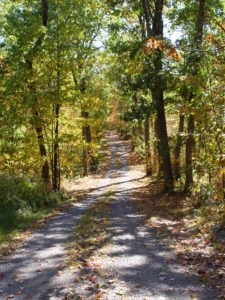 We’d piled into the pickup truck and went searching, taking the back roads that circled our farm, with Dad angrily shifting gears, and me, meek and silent beside him, absorbed in waves of guilt because I was to blame for the Swiss being on the loose.
We’d piled into the pickup truck and went searching, taking the back roads that circled our farm, with Dad angrily shifting gears, and me, meek and silent beside him, absorbed in waves of guilt because I was to blame for the Swiss being on the loose.
When my Dad spotted a farmer in a field he’d pull off the road and stop, and we’d climb through the drainage ditch and walk to the fence and wave hello. Dad would say who he was and ask if the man had seen his cow. These farmers were mostly strangers to him and he explained where we lived and how the Swiss had broken through the fence and wandered off.
The farmers would glance around their land then as if half expecting to see the missing cow in their own fields. They’d shake their heads in a worried way, befuddled, perhaps feeling guilty themselves for they had their own livestock safely under guard.
And then they might ask again where our farm was, and hearing the road, be firmer in the impossibility of a cow having come that far, and having crossed a half dozen country roads.
We came home at midday, still without the cow. Stopping our pickup, Dad got out and slammed the driver side door. The sound reported across the yard like a rifle shot. I could always tell just how mad Dad was by the way he slammed the truck door. He wasn’t a man who spoke about his feelings, but he couldn’t hide from me how he felt.
When I went to apologize again, he shook his head, and reminded me, as if I needed the reminding, that I had never liked the Swiss.
He didn’t chastise me for not bringing in the herd. That was not his way. He’d tug his cap, as if to screw it tighter on his forehead, then shake his head once, grimace. He was never good at expressing emotions, one way or the other. He seldom got angry, but neither was he ever swept away with joy. His emotions were as steady as a canoe paddle pulling through river water. Over time, I came to realize that he thought displays of emotions were a weakness, especially in a man.
Still, my guilt for not locking up the cows rose like a tide against my wellbeing. I asked how much a cow like the Swiss might cost. Oh, my Dad said, speaking in his slow, measured way,
“A good milker could run a hundred dollars.”
He didn’t sound bitter or heartbroken, nor angry, though I was blinking back tears, struggling at the thought of where or how I might raise such an amount of money.
Glancing down at me, seeing my tears, he reached over and gently cuffed me, smiling and saying, “Ah, don’t you worry, lad, we’ll find her.” Then he hitched up his trousers, tugged at his John Deere cap, and fell silent, like Father Luke always did after hearing my confession.
Now I was desperate to find the animal I had spent my life fearing and loathing.
In the afternoon, when Dad was sleeping, I went looking again, trying first to spot the Swiss from the high vantage point of our barn. I could see over several fields from the hayloft doors that looked south and southwest. These were our pasture land, hay and cornfields, and in the distance, the farm of a neighbor, over two hundred acres, which had been recently sold off to a developer. A brand-new subdivision called El Vista was to be built in the cornfields that bordered our place.
The farmer who had sold the land was German, and several generations of the family lived in a cluster of white wooden houses. My parents knew the farming family.
But on the day that the Swiss ran off, I looked out from the farm loft and saw fields with smooth waves of golden wheat and tall yellow corn. It was the last harvest, and the property was being tended to by tenant farmers we did not know, people from rural Kentucky, Dad said, who were living free in the farmhouses, hired by the builders of El Vista, to harvest the crop before construction began that fall.
#
School started the day after Labor Day and there was no more time for me to spend hours wandering the back roads in search of the Swiss, not that there was any hope. The cow had been gone for two weeks.
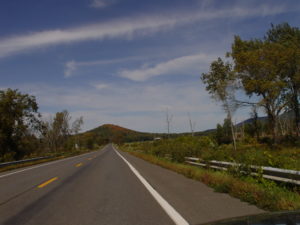 I was done with long days of endless play and searching for something new and different to do around the farm. Now the family was up early and out on the road before eight when the school bus picked up the students for the grammar school in town.
I was done with long days of endless play and searching for something new and different to do around the farm. Now the family was up early and out on the road before eight when the school bus picked up the students for the grammar school in town.
We were the last family on the route and the bus was filled with farm kids we had not seen all summer. It was one of them who mentioned the Swiss, saying in an offhand way that he had heard we were selling off our livestock, moving off the farm. I stared at him, stunned at the idea that our farm too could become a subdivision.
At the age of ten, I knew a world of decisions were made by my parents that had nothing to do with me, or for that matter, any of my older sisters and brothers.
But still, I could not believe Mom and Dad would sell off the livestock, sell our farm, without telling me. Or did my brothers and sisters know and it was being kept from me? News too terrible to tell the baby of the family?
When I quizzed the boy, he shrugged and said all the land around us was being sold off, meaning El Vista.
And there’s your brown Swiss, he said next, tossing off the information, not knowing our cow was missing.
The cow had been spotted. His father had seen her in the tenant farmers’ barn, the southerners who were harvesting the last crop on the old German’s property. His father said we must have sold the cow to these farmers.
I wanted to jump from the school bus and run home with the news, but my Dad, I knew, was working days at the mills and it would be four o’clock before he got home. I could tell him. We could call the police. We could go get the Swiss.
And then I had a better idea.
I thought about all of this during the long hours of school, and it wasn’t until the afternoon that I had devised a plan, one that was grand and heroic. One that would gain me honor and acclaim in my family.
I would bring home the Swiss. I had magnificent visions of myself striding into the barnyard, driving the brown cow safely into our barn to receive a hero’s welcome.
#
Coming home from school, I dropped my books on the kitchen table, then ran off to change clothes and slip out again before my mother could catch me and give me a chore to do.
Free of the house, I jumped the barbed wire back fence and ran across the empty fields, heading for the German’s barn. The stretch of land between our farm and the new subdivision was flat and smooth and open as an ocean.
To hide in case my mother glanced out the kitchen window, I took to the cornfield and ran between the rows until I reached the other edge of the field, within sight of the neighbor’s barn and farmhouse.
The September afternoon was still bright and sunny. The leaves had yet to turn. The sun was high in the sky. I could not dart across the open back yard without being seen. Anyone might spot me. I was a stranger to the tenant farmers.
While I kept myself hidden in the corn at the edge of the field, the tenant farmers kids came out to play in the backyard and I spotted several women walking onto the side porch. Screen doors slammed like rulers slapping school desks and the sound carried across the yard in the silence of the late afternoon.
I moved away from that corner of the field, still hiding in the corn, and circled around behind the barn, moving farther away from the farmhouse and the kids and women sitting on the wide wooden porch. I could not see any of the tenant farmers, nor did I have any idea of how many men there might be working in the field or inside the barn.
I listened for the sounds of tractors or hammering, anything at all that would tell me where the men might be, but all I heard was my own racing heart and the frantic buzzing of horse flies, which had found me, standing still and sweating in the September heat. I peered through the golden corn tassels at the back of the barn where there were a pig pen and chicken coops, and the graveyard of old farm equipment.
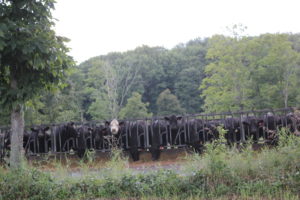 I did not see the Swiss. The cow was not standing under the shade of trees with a small herd of other milkers. She would be hidden inside, I knew, safely out of sight.
I did not see the Swiss. The cow was not standing under the shade of trees with a small herd of other milkers. She would be hidden inside, I knew, safely out of sight.
Before I lost my courage, I bolted from the corn stalks, raced across the yard, scrambled in clumsy haste over the wood fence of the barnyard, and hopscotching dozens of dry cow pies ran straight into the dark, hot barn. At once I saw our Swiss, all alone, held captive by a solitary stanchion.
Seeing her, my heart sank. I realized then how much I missed my old nemesis. I stood in the silent shadowy barn, breathing fast in fear and excitement and kept grinning at the cow.
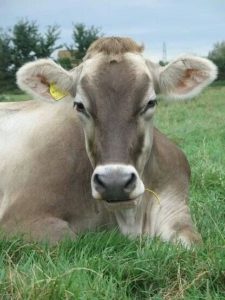 Then I stepped closer and wrapped my arms around her thick neck and pressed my cheek against her side. The Swiss, with the sleepy indulgence practiced by all cows, turned her head lazily in my direction and regarded me with her enormous sad brown eyes without the least bit of interest or understanding of why I was risking my life to steal her home again.
Then I stepped closer and wrapped my arms around her thick neck and pressed my cheek against her side. The Swiss, with the sleepy indulgence practiced by all cows, turned her head lazily in my direction and regarded me with her enormous sad brown eyes without the least bit of interest or understanding of why I was risking my life to steal her home again.
Regardless, I realized I loved this cow, and that she was mine, our family, and nothing would stop me from bringing her safely home.
I thought of all this in the few moments it took for my eyes to adjust to the shadowy darkness and to realize I wasn’t alone in the huge barn; people were up in the loft stacking hay.
Above me, the wide floorboards squeaked and dust and lose hay showered through the filtering sunlight. I heard muffled voices, a short burst of laughter, and then from outside the barn a truck turned into the yard and stopped. I knew the sound of that truck’s engine and my heart froze.
The men stopped talking and then between them some hurried and fierce whispered words, and they came running downstairs, moving quickly, their heavy footfall drumming a quick beat, like the descending of the musical scale, on the wooden stairs.
I quickly freed the Swiss from the stanchion, waving my arm to shoo her out. She backed away, frightened by my haste. I pushed open the wide barn door and before I could even turn away, the cow bolted by me and into the sunlight of the barnyard. She was suddenly like a young colt, jumping and cascading left and right, trying to shake the stiffness from her legs.
I ran from the barn and raced towards the opposite end of the yard where there was a gate leading into the open pasture, and from there, at the far end, another gate, which I could drive the Swiss through and run her between the rows of corn back to our home.
My father’s voice halted me in flight. He called my name and I skidded to a stop in the middle of my great escape.
He was standing with two of the tenant farmers, his leg propped up against the low board of the wooden barnyard fence, and leaning forward with his elbows braced against the top board. It was the stance all farmers had when they stopped work to chat with a visitor. The scene appeared to have a rehearsed formalness to it. As if the men were now playing some sort of movie part.
My Dad had come straight here from work and had not even changed into his farm clothes, though he did have his John Deere cap screwed down tight over his forehead. In the bright sunlight, I could not tell if he was smiling at me across the width of the barnyard. I did not know if I was in trouble for what I had already done, for what I was trying to do.
I walked reluctantly back to the men, kicking at the dry cow pies and frantically trying to think of some quick reason for why I was in the strangers’ barn and had let loose the Swiss.
But the great advantage of being a kid is that you don’t have to explain yourself unless asked, and I wasn’t asked, not immediately at least. Later I told my story and learned that Mom had spotted me racing off from the house, and heard from my older sister what had been said on the school bus. When Dad arrived home from work, she had told him at once, and he had come after me to deal with the tenant farmers.
Now, I didn’t know if we would have trouble. The two men were bigger, stronger, younger than my Dad, and they might fight him over the cow. And me! I had seen enough G-Men serials in our town’s movie theatre to know crooks and thieves always carried guns and weren’t above killing a kid. I glanced back at the pasture, wondering if I could outrun a bullet.
“You took good care of her, lads,” my Dad was saying to the men, smiling, and gesturing toward the Swiss. “Well now, let’s see if I can get young Jack here to keep her off your land.” He went on grandly, telling them that they were fine neighbors for rescuing his milker, speaking in that elaborate way he had when he was trying to be nice but not fully meaning it. “And won’t I be blessed to have lads like you watching out for my cows,” he summed up.
The southerners were listening hard, trying to understand his Irish brogue. They were both still in their twenties, with long, yellow hair, sharp-angled faces, and wild eyes. Dad’s brogue was too thick and syrupy to be comprehensible to them. I also knew Dad had a way of making himself sound impenetrable when it suited his purpose.
”You’ll take the Swiss home now, Jack,” he said, nodding to me.
I caught the squint in his blue eyes, still hidden in the dark shadows of his cap, and I knew he wanted me to be safely away before he left the tenant farmers’ yard.
He then went back to talk to the men, asking them their names, and where they were from. He spoke now with the directness of a politician seeking votes. He pulled their attention to him and away from the Swiss, away from me, and what I was doing, skipping off, and driving the cow from their barnyard.
I steered the Swiss across the pasture and cornfields and home again, arriving just as Dad did, driving our old truck off the farm road and into our yard.
Mom had come out of the kitchen and was wiping her hands on her white apron. She had seen me approaching with the cow from her kitchen window. And there were my brothers and sisters, too, coming from the house, all to watch my small triumph, just as I had imagined it might happen.
Dad opened the barnyard gate and I drove the cow safely inside. Passing Dad, I glanced up and caught the twinkle in his blue eyes. He didn’t say anything. Instead, he only winked, and reaching down gently cuffed the back of my neck with his strong hand. That was his way.
That was enough.
The End
John Coyne is the author of twenty-eight books of fiction and nonfiction. He is currently an adjunct professor in the MFA Creative Writing program at the National University of California.
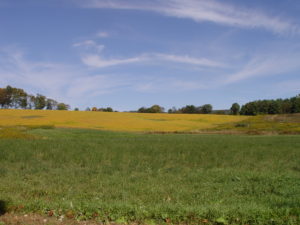
Wonderful story. Thank you
Thanks. Enjoyed it.
A delightful story. I began it, then wavered, but remembered my days working on farms but with black and whites – no Swiss…. And a happy ending! always welcome!
Great story, John. And it reminded me of my encounters with a vicious turkey at age three.
I couldn’t stop reading until the cow was home. What a sentence turner. Is this part of an autobiography?
A great story John, thanks for sharing. It also made me think of an uncle who played Elvis Presley and Righteous Brothers songs for the cows at milking time.
A treat, John. Thank you.
I loved the story and loved learning about your childhood, John. It was a double treat and I couldn’t stop reading. Might go back and read it again so I can be there with you on a hot summer day walking through the tall grasses that smell so sweet.
Our little farm in Adams County, Wisconsin was bordered on the south by the Little Roche-A-Cri Creek. We pastured our dairy herd in the creek bottoms during the summer. On the other side of the creek was the fairgrounds, and south of that a small farm on the edge of town (the village of Friendship). The old farmer no longer raised livestock so when he saw cows in his fields, he knew they were ours. He’d call and 3-4 of us kids would be dispatched to bring home the escapees while Dad set about fixing the fence.
We also had cattle cross the creek in the other direction. During the Adams County Fair a bovine or two would often escape their owners, cross the creek and join our herd. We would bring the animal(s) into the barn along with our milk cows, securing them in a stanchion or pen. Then Mom would call the Fair administration and inform them. The owners would arrive with a truck or cattle trailer and take the animal(s) back to the Fair.
Thanks John, your story caused me to remember my own days of rounding up cattle!
That was fun, John. I had no idea that my Addis roommate had an agrarian background.
John, I never knew you were a cowboy and a cattle rustler to boot. Your reputation as a teller of Western (Michigan) tales has soared. I enjoyed your story very much.
Felt like a trip thru time and space , for a long moment I was there …..thanks John !
It’s a beautiful story and a learning experience for those like myself who had a big city growing-up experience. It’s a reminder of the sacrifices parents make to provide what they want for their children. And it’s a joyous story of living on a farm. Thanks for sharing this, John.